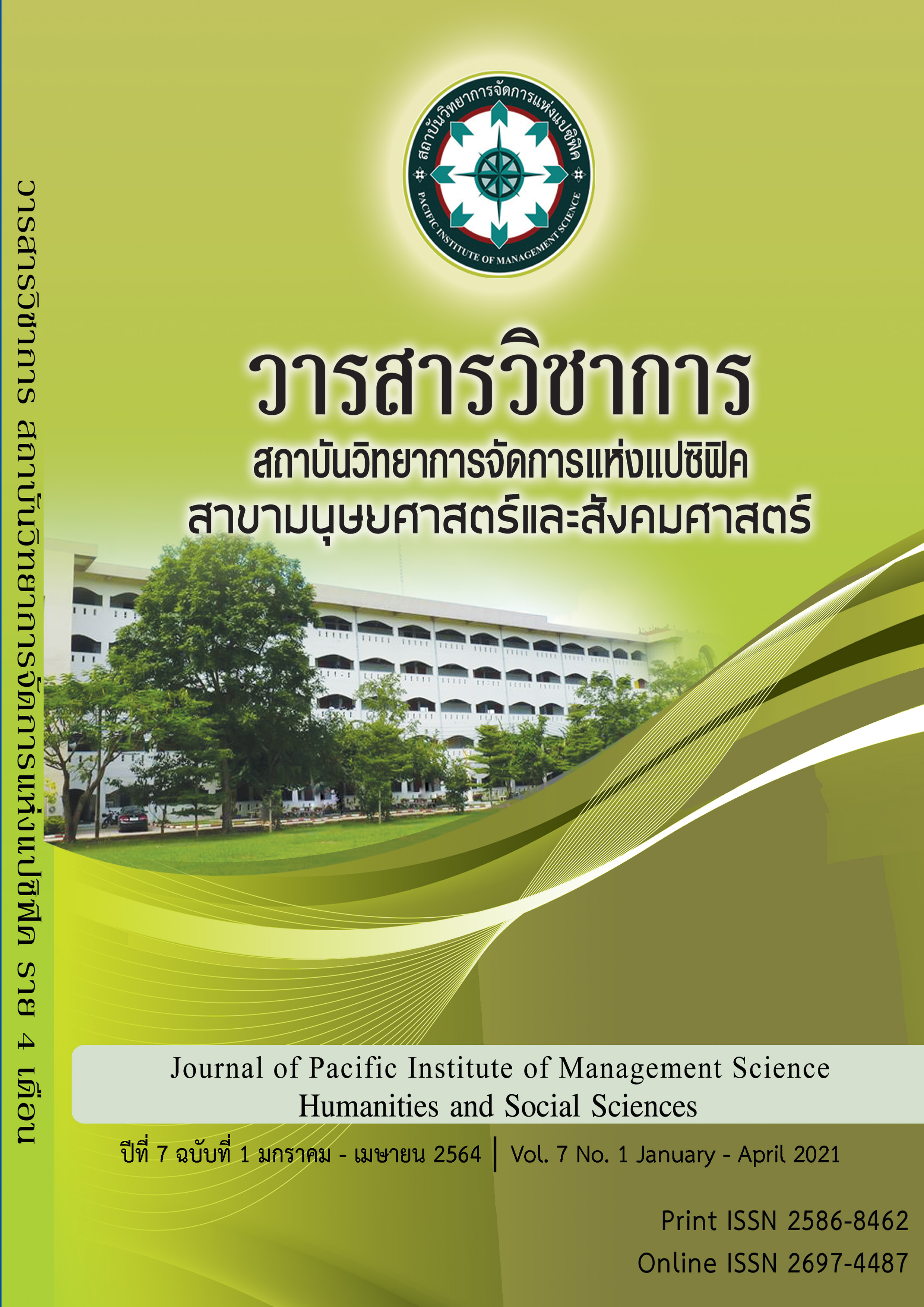Motivation model for reducing the use of chemicals in the Water Chestnut’s farm in Si Prachan district Suphanburi Province
Keywords:
motivation, bio and chemical-agriculture knowledge factor, chemical fertilizer reduction in water chestnut fieldAbstract
Objectives of this study included the investigation about motivation to reduce chemical fertilizer usage and propose the model of Motivation factors for reducing the use of chemicals in the Water chestnut’s farm in Si Prachan district Suphanburi Province This study was a qualitative research that applied focus group and in-depth interview to collect data. Participants in the focus group included 2 groups of water chestnut growers in Wangyang Sub-district.The researcher had consulted sample recruitment with Wangyang community leader, Participants with in-depth interview included 4 water chestnut growers including a farmer who was using bio-fertilizer, a farmer who used to use bio-fertilizer and was using chemical fertilizer, a farmer who reduced using chemical fertilizer and another farmer who was primarily using chemical fertilizer. Interview guide was applied with the interview. We had codified data from tape recording, classified data and transcribed the data into a concept based on content analysis.
The research found that The motivation to reduce the use of chemicals is divided into 3 types: 1) The motivation to reduce the use of chemicals successfully consists of 1.1) Motivation in the group that was originally produced by using chemical and changed to reduce use chemicals. The important motivation to reduce the use of chemicals successfully are Social motivation, Economic motivation, Health motivation, Family relationship motivation, And personal motivation and 1.2) motivation in the group that used biological substances and changed to reduce the use of chemicals, the important motivation to reduce the use of chemicals successfully are Economic motivation And the difficulty in producing water chestnut by using biological substances 2) motivation to produce water chestnut by using biological substances Consisting of social motivation, Motivation in knowledge about using biological substances, And personal motivation 3) factors that make farmers still produce water chestnut by using chemicals mainly are Economic factors, Knowledge of chemical use Belief factor that no fertilizer or chemical residue, Marketing factors, And the difficulties in the operation. Suggestions from this research were focusing on motivating water chestnut growers who possessed small field or applying new agricultural theory in Wangyang Sub-district, Sriprachan District, Suphan Buri Province to reduce chemical fertilizer usage. We also recommended to create a network of agriculturists and specialists to advise about bio-fertilizer usage and reducing chemical fertilizer so that agriculturists could save their production cost and increase their yield. In addition, there should be an activity to encourage self-determination and intention among agriculturists to reduce chemical fertilizer usage consistently.
References
เครือข่ายเตือนภัยสารเคมีกำจัดศัตรูพืช(ไทยแพน).(2555). นโยบายและกฎหมายที่เกี่ยวข้องกับสารเคมีกำจัดศัตรูพืช.(ออนไลน์) เข้าถึงได้จาก http://www.thaipan.org/node/337 วันที่สืบค้น 14 มิ.ย.60.
จําเลียง หมื่นวัน และคณะ.(2557) ทำการศึกษาการยอมรับการผลิตผักปลอดภัยจากสารพิษของเกษตรกรในจังหวัดปทุมธานี. (ออนไลน์)เข้าถึงได้จาก http://www.stou.ac.th วันที่สืบค้น 16 เม.ย. 2560
นัทธ์หทัย ศิริวริิยะสมบรณู ์ ธํารงค์เมฆโหรา และทิพวรรณ ลิมังกูร (มปพ.) ปัจจัยที่มีผลต่อการยอมรับการปลูกผักปลอดภัย จากสารพิษของเกษตรกรในอำเภอบางใหญ่ จังหวัดนนทบรี.วารสารเกษตรพระจอมเกล้า30:2 น.59-67.
รณชัย โตสมภาค.(2558). ผลกระทบของสารเคมีการเกษตรต่อสุขภาพของเกษตรกรและผู้บริโภค : แนวทาง ในการควบคุมการใช้สารกำจัดศัตรูพืชเพื่อสร้างความมั่นคงทางสุขภาพของผู้ประกอบการ ภาคเกษตรกรรมและผู้บริโภค.สำนักวิชาการ สำนักเลขาธิการสภาผู้แทนราษฎร.(ออนไลน์) เข้าถึงได้จาก http://www.parliament.go.th/library/วันที่สืบค้น 14 มิ.ย. 60.
วนิดา สุจริตธุรการ และจิตผกาธนปัญญารัชวงศ์. (2560) .ปัจจัยที่มีผลต่อการยอมรับการผลิตและใช้ปุ๋ยอินทรีย์ของเกษตรกร ในอำเภอหาดใหญ่จังหวัดสงขลา Suranaree J. Soc. Sci. Vol. 4 No. 1; June 2010 (29-44).
วาสนา พัฒนานันท์ชัย, 2553 ปัจจัยที่มีผลต่อแรงจงใจในการปฏิบัติงานของพนักงาน สํานักงานทรัพย์สินส่วนพระมหากษัตริย์, ศิลปศาสตรมหาบัณฑิต (การบริหารการพฒนาสังคม) คณะพัฒนาสังคมและสิ่งแวดล้อม สถาบันบัณฑิตพัฒนบริหารศาสตร์.
วรรณวิมาล ภัทรสิริวงศ์, กฤษณะ ป้องนานาค, สุรัตน์ หงษ์สิบสอง, ธัญภรณ์ เกิดน้อย. (2557). การศึกษาพัฒนาแนวทางการลดใช้สารเคมีในการเกษตรด้วยกระบวนการวิจัยแบบมีส่วนร่วม: กรณีศึกษาอำเภอแม่แตง จังหวัดเชียงใหม่.กรุงเทพมหานคร : ระบบบริหารจัดการงานวิจัยแห่งชาติ (NRMS).
ศิริวรรณ เสรีรัตน์และคณะ. 2541. พฤติกรรมองค์การ. กรุงเทพมหานคร: ธีระฟิลม์และไซเท็กซ์.
ศุภวรรณ รัตนโอภาส. 2550. แรงจงใจในการปฎิบัติงานของพนักงานที่มีต่อองค์กร: ศึกษากรณี โรงแรม เอ - วัน เดอะรอยัลครูส พัทยา. ปัญหาพิเศษคณะรัฐประศาสนศาสตร์ มหาวิทยาลัยบูรพา.
สุธีรา สถาปัตย์ และคณะ. (2556). การยอมรับการใช้สารชีวภาพเพื่อลดและทดแทนการใช้สารเคมีในการผลิตพืชปลอดภัยของเกษตรกร จังหวัดแพร่. รายงานการประชุมเสนอผลงานวิจัยระดับบัณฑิต ศึกษามหาวิทยาลัยสุโขทัยธรรมาธิราช ครั้งที่ 3. มหาวิทยาลัยสุโขทัยธรรมาธิราช.
สำนักงานนโยบายและยุทธศาสตร์การค้า กระทรวงพาณิชย์.(2559). อุปสรรคแรงงานไทยในภาคเกษตรกรรม. วารสาร สนค. ปีที่ 6 ฉบับที่ 57 เมษายน 2559.(ออนไลน์)เข้าถึงได้จาก http://www.tpso.moc.go.th/sites/default/files/tpso_journal_apr_59_issue_57.pdf วันที่สืบค้น 12 มิ.ย. 60.
อรทัย รวยอาจิณ.(2549). การพัฒนาสุขภาพแบบองค์รวม:การวิจัยเชิงพัฒนาโดยการมีส่วนร่วมของชาวนา.บริษัทวิสคอมเซ็นเตอร์ จำกัด.301น.
Downloads
Published
Issue
Section
License
บทความที่ได้รับการตีพิมพ์เป็นลิขสิทธิ์ของ สถาบันวิทยาการจัดการแห่งแปซิฟิค
ข้อความที่ปรากฏในบทความแต่ละเรื่องในวารสารวิชาการเล่มนี้เป็นความคิดเห็นส่วนตัวของผู้เขียนแต่ละท่านไม่เกี่ยวข้องกับสถาบันวิทยาการจัดการแห่งแปซิฟิค และคณาจารย์ท่านอื่นๆในสถาบันฯ แต่อย่างใด ความรับผิดชอบองค์ประกอบทั้งหมดของบทความแต่ละเรื่องเป็นของผู้เขียนแต่ละท่าน หากมีความผิดพลาดใดๆ ผู้เขียนแต่ละท่านจะรับผิดชอบบทความของตนเองแต่ผู้เดียว







